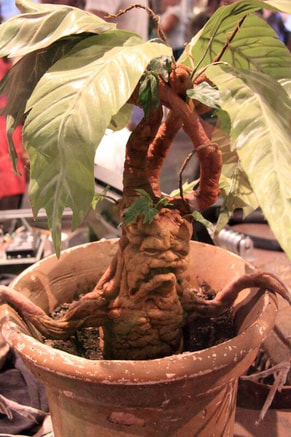Recently, as I was researching mandrakes for a sermon I was preparing, I discovered that Harry Potter apparently used some of the folklore of the mandrake by creating these characters such as the one shown above. Without watching the movies or reading the books, I can form a few ideas about these characters based on the history of mandrakes.
First, in case you aren't sure, let me explain the background of the sermon. I preached a message called "Trying to Get Ahead of God" where we briefly looked at the story of Rachel and Leah and their battle over who would bare the most children for Jacob. In this story, Rueben finds mandrakes in the field and brings them to his mother, Leah. When Rachel finds out Leah has them, she tries to make a deal with her to use the mandrakes for her own benefit (Genesis 30:14-16).
I always assumed there was some sort of superstitious belief, or an old wives' fable that made her think that these mandrakes were going to help her situation. After all, this same Rachel later steals her father's idols before leaving his house. Admittedly, I don't know why she stole them, but it leads me to believe she was superstitious. When you compare that to the part where Jacob is pealing white spots on sticks in hopes that the cattle that looked at the stick would produce offspring that were spotted, ringstraked, and speckled; you have to assume superstition was a pretty common thing in that family.
Before studying it out, I really had no idea what a mandrake was. All I could think in my head was "mangrove" (a tree whose roots grow down into the water), and I never really looked that deeply into it. Then, when I decided to look it up, I saw a few things immediately:
- The reason it is called a "man" drake is that the root resembles a man.
- It is a potent stimulant whose side-effects can include: blurred vision, dilation of the pupils, dryness of the mouth, difficulty in urinating, dizziness, headache, vomiting, blushing and a rapid heart rate, hyperactivity and hallucinations.
- They were often formed into amulets which were believed to bring good fortune, cure sterility, etc.
- There are legends that claimed that people who pull up this root will be condemned to hell.
- And there were claims that the mandrake root would scream and cry as it was pulled from the ground, killing anyone who heard it.
One can quickly see why modern day fiction writers would be interested in this folklore... especially when it comes to Hollywood and visual effects. And, for obvious reasons, this became a popular ingredient for witches to use in their concoctions (brews, ointments... "magic potions"). Because of its hallucinative properties, it was apparently used in witches' "flying potions" (I'm not sure where the notion of witches flying on brooms came from... but maybe some hallucinated and were convinced that is what they were doing).
This doesn't necessarily prove that Rachel was superstitious or that she believed these plants had "magical power," but it seems to validate the notion that she was seeking help outside of God and taking matters into her own hand. Like Rachel, we are often tempted to turn to the advice of worldly "doctors," drugs, old wives' tales, or (even worse) superstitious practices and "curious arts" to help get us out of a situation or to gain something that God didn't necessarily intend for us to have.
Doctors have their place, medicine has its place... but let's try not to get ahead of God and seek after things without first seeking Him and being content with such things as we have.
I'm reminded of King Asa:
2Ch 16:12 And Asa in the thirty and ninth year of his reign was diseased in his feet, until his disease was exceeding great: yet in his disease he sought not to the LORD, but to the physicians.


 RSS Feed
RSS Feed

